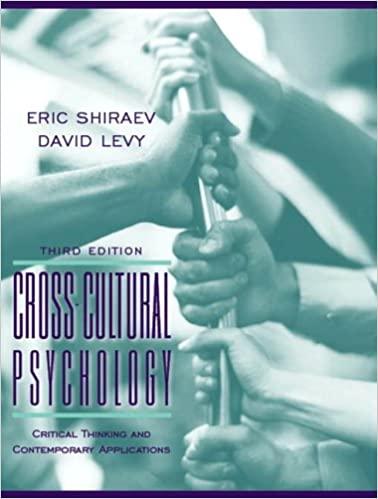Question
The outline (shown here) for this assignment, conduct research and use personal examples to complete it. You will also be evaluated based on the following
The outline (shown here) for this assignment, conduct research and use personal examples to complete it. You will also be evaluated based on the following criteria: Make sure to include an introduction (where you state your position), a body (supporting that position), and a conclusion (wrapping everything up). How effectively you back up your stance?
Paper Outline
Thesis Statement: Psychology as a Science - What is Psychology?
I. Introduction
A. Psychology plays a crucial role in understanding human behavior and mental processes.
B. The definition of psychology as a science has evolved over time, reflecting advancements in research and theory.
C. Thesis statement: Psychology is the scientific study of behavior and mental processes, encompassing both observable actions and internal cognitive functions.
II. Definitions of Behavior and Mental Processes
A. Behavior refers to the observable actions or responses of an organism to external stimuli.
1. Examples of behavior include smiling, walking, and speaking.
B. Mental processes encompass internal cognitive activities such as perception, memory, reasoning, and emotion.
1. These processes are not directly observable but can be inferred from behavior and self-report.
C. The relationship between behavior and mental processes is complex, with each influencing the other.
1. For example, emotions can influence behavior, while cognitive processes shape our perceptions and interpretations of the world.
III. Rationale for Including Mental Processes
A. Mental processes are essential for understanding the complexities of human behavior.
1. Studying cognitive processes allows psychologists to explore how individuals perceive, think, and make decisions.
B. Mental processes provide insights into the underlying mechanisms of behavior.
1. Understanding memory processes, for instance, helps explain why people forget or remember certain information.
C. Excluding mental processes would limit the scope of psychology and overlook fundamental aspects of human experience.
1. Ignoring cognitive processes neglects the subjective experiences and internal states that influence behavior.
IV. Contrasting Viewpoints
A. Some psychologists argue for the exclusion of mental processes from the definition of psychology, advocating for a focus solely on observable behavior.
1. Behaviorists, such as B.F. Skinner, emphasize the importance of studying external behaviors rather than internal mental states.
B. Behaviorist perspective on the study of behavior over mental processes
1. Behaviorism dominated psychology in the early 20th century, emphasizing objective, measurable behaviors.
2. Mental processes were deemed too subjective and difficult to study scientifically.
C. Critics argue that excluding mental processes overlooks significant aspects of human behavior and cognition.
1. Cognitive psychologists have since challenged behaviorism, highlighting the importance of internal mental processes in understanding behavior.
V. Proposed Nuanced Definition
A. A complete understanding of psychology includes both behavior and mental processes.
1. Psychology is the scientific study of observable actions and internal cognitive functions.
B. This definition allows for a more holistic understanding of human behavior, integrating both external behaviors and internal mental states.
1. Studying behavior and mental processes together allows psychologists to have a comprehensive understanding of human cognition, emotion, and motivation.
C. Adopting a broad viewpoint encourages collaboration across different fields and enhances our knowledge of the human mind and behavior.
VI. Conclusion
A. Psychology is a diverse and ever-changing field that constantly improves its comprehension of human behavior and mental processes.
B. Describing psychology as a field that covers behavior and mental processes recognizes the intricate nature of human experience and the value of interdisciplinary studies.
C. Restating the main idea: Psychology involves examining behavior and mental processes to gain valuable insights into the human mind.
References:
- Schacter, D.L., Gilbert, D. T., Nock, M.K & Wegner, D.M. (2018). Introducing Psychology (4th ed.). New York: Worth Publishers.
Ferguson, C. J., Kazak, A. E., & Anderson, N. B. (n.d.). "Everybody Knows Psychology Is Not a Real Science": Public Perceptions of Psychology and How We Can Improve Our Relationship With Policymakers, the Scientific Community, and the General Public.
Step by Step Solution
There are 3 Steps involved in it
Step: 1

Get Instant Access to Expert-Tailored Solutions
See step-by-step solutions with expert insights and AI powered tools for academic success
Step: 2

Step: 3

Ace Your Homework with AI
Get the answers you need in no time with our AI-driven, step-by-step assistance
Get Started


